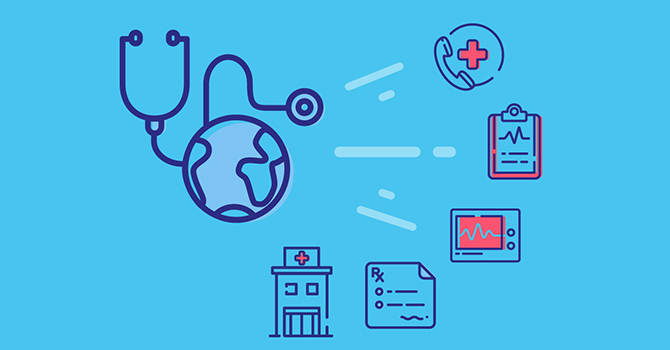Why Healthcare RCM is Crucial for Financial Wellness in Medical Practices
Why Healthcare RCM is Crucial for Financial Wellness in Medical Practices
Blog Article
Comprehending the Role of Health Care RCM in Enhancing Financial Efficiency and Patient Contentment
Navigating the ins and outs of Health care Income Cycle Monitoring (RCM) is vital for achieving ideal financial efficiency while concurrently elevating client satisfaction. As we check out the transformative potential of RCM, concerns regarding its strategic application and future innovations bid, encouraging insights that could redefine industry criteria and individual experiences alike.

Key Elements of RCM
In the complicated landscape of healthcare, Income Cycle Administration (RCM) is critical in making certain financial security and operational efficiency. An extensive RCM system includes a number of important parts, each playing an important function in the smooth monitoring of a health care carrier's economic procedures. Patient registration and qualification confirmation are foundational actions, guaranteeing that exact client information is caught and insurance protection is validated before solutions are provided. This reduces the threat of case rejections and increases the reimbursement procedure.

Charge capture is an additional crucial element, including the exact recording of services provided to people. It ensures that all billable services are represented, thus taking full advantage of profits potential. Concurrently, clinical coding translates patient experiences into standard codes, which are critical for payment and regulative compliance.
Cases submission and management comply with, involving the preparation and submission of claims to payers. This procedure calls for precise focus to detail to lessen mistakes and prevent delays. Rejection monitoring is a proactive method to attend to and settle rejected cases, protecting income streams.
Last but not least, settlement publishing and individual collections complete the cycle, making sure payments are precisely taped and impressive balances are pursued. With each other, these elements create a robust framework that sustains the functional and monetary health and wellness of medical care companies.
Effect on Financial Efficiency
Effective Profits Cycle Monitoring (RCM) significantly affects a healthcare company's economic efficiency by optimizing capital and reducing income leak. RCM includes the comprehensive billing and collection procedures that ensure doctor efficiently manage their financial purchases from client enrollment to last repayment. By improving these procedures, organizations can reduce refuted claims, expedite repayment cycles, and enhance total economic wellness.
Economic performance is boosted with meticulous administration of payment treatments, which includes exact coding and timely entry of cases. This lowers the likelihood of case rejections and beings rejected, which can significantly impede income flow if not attended to promptly. Moreover, incorporating sophisticated modern technology services promotes real-time monitoring of claims and monetary metrics, offering health care managers with the devices needed to make enlightened tactical choices.

Enhancing Person Contentment
While optimizing financial efficiency is an essential objective of Profits Cycle Monitoring (RCM), it additionally plays an essential role in improving individual satisfaction. Clients today demand transparency, efficiency, and accuracy in their healthcare interactions. RCM systems streamline these processes, offering people a seamless experience from consultation organizing he said to settlement. By lowering administrative problems, RCM enables medical care carriers to concentrate more on individual care, which directly boosts patient fulfillment.

RCM additionally improves client complete satisfaction via efficient communication. By preserving an extensive data source of patient info, RCM assists in enhanced interaction in between clients and healthcare service providers, ensuring people really feel notified and valued.
Strategies for Effective RCM
Accomplishing efficient Profits Cycle Administration (RCM) calls for health care companies to carry out a collection of tactical practices that guarantee financial security and operational effectiveness. One critical strategy is the adoption of technology-driven solutions, such as integrated software program systems that enhance billing procedures, decrease errors, and enhance information precision. These systems make it possible for real-time tracking of monetary metrics, enabling timely recognition and rectification of inefficiencies.
An additional method is the standardization of processes throughout the income cycle. Healthcare RCM. This involves developing consistent plans for individual registration, insurance policy verification, and claims processing. By making sure that all team comply with these requirements, companies can decrease disparities and accelerate payment collections
Team training and growth also play a critical duty in reliable RCM. Well-trained workers can successfully navigate complex payment procedures and policies, boosting and decreasing rejections capital. Routine updates on policy modifications and best techniques assist keep a knowledgeable and competent workforce.
Future Trends in RCM
As medical care organizations enhance their Income Cycle Administration (RCM) methods with technology and standard processes, focus is currently transforming in the direction of the future patterns forming this important area. One significant trend is the combination of expert system (AI) and machine her response learning to automate intricate jobs, such as cases processing and anticipating analytics. These technologies are anticipated to minimize mistakes, increase transaction times, and offer data-driven understandings for far better decision-making.
In addition, the shift in the direction of value-based care remains to affect RCM methods - Healthcare RCM. Healthcare carriers are expected to increasingly concentrate on client results and contentment, requiring RCM systems that can accommodate brand-new reimbursement versions. This shift will certainly call for more extensive data collection and analysis to successfully measure and report on performance metrics
Interoperability is an additional emerging top priority, as seamless data exchange in between inconsonant systems ends up being critical. Improved interoperability will promote more precise individual information sharing, lowering management burdens and enhancing the patient experience.
Final Thought
Health Care Profits Cycle Administration (RCM) dramatically affects both financial efficiency and patient satisfaction by enhancing payment procedures, guaranteeing precise coding, and enabling punctual cases entry. Reliable RCM reduces profits leak and increases cash money flow, decreasing case denials and speeding up repayments.
Browsing the details of Medical care Revenue Cycle Monitoring (RCM) is vital for accomplishing ideal economic efficiency while simultaneously boosting patient satisfaction. RCM incorporates the extensive invoicing and collection procedures that ensure healthcare companies efficiently handle their financial deals from client enrollment to last payment. By lowering management worries, RCM permits medical care suppliers to concentrate more on individual care, which straight enhances individual complete satisfaction.
By preserving a detailed data source of patient info, RCM helps with enhanced interaction in between people and healthcare suppliers, making certain clients feel informed and valued.Health Care Revenue Cycle Monitoring (RCM) dramatically affects both monetary efficiency and client complete satisfaction by enhancing payment procedures, guaranteeing precise coding, and making it possible for timely insurance claims entry.
Report this page